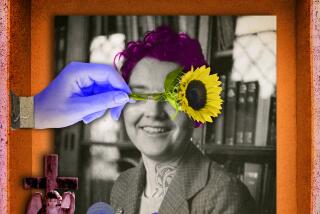All You Need Is Loss : BLUE EYES, BLACK HAIR <i> by Marguerite Duras; translated by Barbara Bray (Pantheon Books: $13.95; 95 pp.) </i>
- Share via
Long recognized in Europe as a novelist specializing in psycho-sexual distress, Marguerite Duras has only recently found a wide American audience. Her novel, “The Lover,” received enormous acclaim in 1985, followed closely by “The Malady of Death” and now “Blue Eyes, Black Hair.” The three books retain the spare elliptical style for which Duras has long been noted, a style born in part out of her film work (“Hiroshima, Mon Amour”) and a brief identification with the nouveau roman of the ‘50s and ‘60s. One of her finest novels, “Destroy, She Said,” Duras turned into a film that she directed. Indeed, “Blue Eyes, Black Hair” most strongly resembles that book, though the earlier work kept much of the sexual anxiety suppressed in favor of a larger theme of revolutionary politics. Thematically, the new book follows a continuum begun more than 20 years ago with “The Ravishing of Lol Stein,” a compelling analysis of sexual self-destruction.
“Blue Eyes, Black Hair” dramatizes, in claustrophobic reductive scenes, the sexual suffering of an unnamed man and woman at a French seaside resort. The man is a homosexual who one summer night is awe-struck by the glimpse of a heterosexual foreigner in the company of a woman. The stranger disappears, leaving behind a rich, painful fantasy and a “sexual sadness that makes the eyes seem to have seen everything.” The hero’s obsession not only brings him to tears with cloying regularity but urges him to thoughts of murder and, in an attempt to suffuse his life with the foreigner’s, into an “impossible” love-hate relationship with the young woman who, after three passionate days with the northern stranger, “weeps for an affair and a story that never were.”
For much of the novel, the young woman lies naked in the light of a bare bulb in the man’s empty seaside house, sometimes covered by a white sheet, her face by a piece of black silk, as she sleeps for him while he watches and thinks of his lost love, of murder, of loving this woman who was so close to his fantasy: “He needs her, needs her there in the room, so he can weep for the young foreigner with blue eyes, black hair.” He insists on paying her to do this, though out of her sudden love for him, she would rather do it for nothing. Theirs is a nightly vigil over the body of a memorable impossibility of perfect adoration. Nothing happens, little is said. As lovers, they do not touch because what they have found in common is the death of hope. This is a minimalist picture of passion, fragments of repeated imagery and feeling that seem always to conclude a phrase too early. Were this music, it would be Webern’s.
Because the young woman intends to be a writer, we are offered scenes of the relationship as though it were a stage play, with actors advised not to act but to speak the words of the novel we are reading, all as though the affair will one day become a book, a book being the fondest form of memory. This novel is a fiction of gestures rather than events, snapshots of a sexual yearning so frustrated that the idea of desire replaces desire itself. The homosexual hero desires not the woman but the fact of her proximity to the lost foreigner; she reminds him of his wasted existence, reminds him that he is “disaster personified.” In her presence, his grief looms larger than the mere loss of what was already impossible in his sexual life. The reality of longing erases the world in favor of an idea of it, the way a kiss stands for a love affair. So theirs would be a tale of essences, a ritual in which the skeleton must suggest the flesh that has not yet grown to the bone.
“Blue Eyes, Black Hair” is one of those minor erotic fictions that contemporary French literature celebrates. One finds it in Bataille, Blanchot and Robbe-Grillet--the familiar business of sex and death at a seascape, with parched characters whose sexual obsessions are poetry and whose longing becomes mordant philosophy: “You haven’t got a place, and you don’t know where to find one. And it’s for that that I love you and that you are lost.” Indeed. The problem with this novel is that in its effort to evoke mystery, it is woefully precious and sentimental. The characters do not so much feel as wax poetic. They are in fact too immature in their passions to be dramatic for very long, and since they are more temperament than flesh, more given to tableaux than action, it is difficult to be concerned with their fates. Theirs is the sort of despair that evokes irritation rather than sympathy, boredom rather than puzzlement. The earlier Duras did it better.
More to Read
Sign up for our Book Club newsletter
Get the latest news, events and more from the Los Angeles Times Book Club, and help us get L.A. reading and talking.
You may occasionally receive promotional content from the Los Angeles Times.









